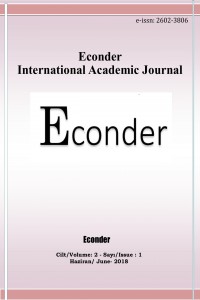Öz
Bu çalışma 2011 uluslararasılaşmış Libya sivil savaşının ve
Kaddafi rejiminin çöküşünün nedenlerini açıklamayı amaçlamaktadır. Buna karşın,
bu çalışmanın öncelikli amacı, sivil savaş ve uluslararası müdahalenin
açıklanmasında ihmal edilmiş iki teori olan rantar devlet teorisi ve kaynak
laneti teorisinin yararlılığını değerlendirmektir.
Rantar devlet teorisi doğal kaynakların kontrolünün ve
dağıtımının devlet gücü açısından önemli olduğunu savunur; ama rantar devletler
özellikle uluslararası ekonomik değişimlerle yüz yüze geldiğinde uzun süreçte
kırılgan ve kalıplaşmış özellikler sergilemektedir. Kaynak laneti teorisi,
kaynak zengini ülkelerin devlet içinde bulunan zengin kaynakları yüzünden
kaçınılmaz şekilde zayıfladığını savunur. Bu zengin kaynaklar, üzerlerinde
kontrol elde edebilmek amacı taşıyan iç ve dış mücadeleler oluşturmaktadır.
Detaylandırılarak ve kritik edilerek bu iki teori dünyadaki petrol
zengini ülkelerden biri olan Libya üzerine uygulanacaktır. 1969’dan beri
Kaddafi yönetiminde ki uzun ve kalıcı rejimin çökmesi kaynak laneti teorisi ile
açıklanabilir mi? Kaddafi rejimi nasıl ve niye çöktü? Libya’nın deneyimleriyle
şekillenen iç ve dış dinamikler test edilerek bu soruların olası cevapları
irdelenecektir.
DİKKAT!
Metin Econder sitesinde belirtilmiş Econder Şablon'u içerisine Mizanpaj'da belirtilen usüllere göre düzenlenmiştir.
Anahtar Kelimeler
Kaynakça
- Acemoglu, D. & Robinson, J. (2012). Why Nations Fail: Origins of Power, Poverty and Prosperity.
- Altunisik, M. B. (1996). ‘A Rentier State's Response to Oil Crisis: Economic Reform Policies in Libya’. Arab Studies Quarterly, 18, 49-64.
- Anderson, B. (2006). Imagined Communities: Reflections on the Origin and Spread of Nationalism (New Edition). Verso.
- Aslan, N. (2014), “Evaluating Rentier Theory and Resource Curse Theory: The Case of the Libyan Civil War”, Yüksek Lisans Tezi, Orta Doğu Teknik Üniversitesi.
- Auty, R. M. (2001). ‘The political economy of resource-driven growth’. European Economic Review, 45(4), 839-846.
- Atlas.media.mit.edu/country/lby
- Beblawi, H., Luciani, G. (1987), The Rentier State (Vol.2), Routledge.
- Beblawi, H. (1990). ‘The rentier state in the Arab world’. The Arab State, 85- 98.
- Collier, P. & Hoeffler, A. (2005). ‘Resource rents, governance, and conflict’. Journal of Conflict Resolution, 49(4), 625-633.
- De Soysa, I. (2000). ‘The Resource Curse: Are Civil Wars Driven by Rapacity or Paucity?’. (retrieved from http://reseau.crdi.ca/en/ev-124489-201-1- DO_TOPIC.html)
- Di John, J. (2011). ‘Is There Really a Resource Curse? A Critical Survey of Theory and Evidence’. Global Governance, 17(2), 167-184.
- Herb, M. (2005). ‘No representation without taxation? Rents, development, and democracy’. Comparative Politics, 297-316.
- Humphreys, M. (2005). ‘Natural Resources, Conflict, and Conflict Resolution Uncovering the Mechanisms’. Journal of Conflict Resolution, 49(4), 508-537.
- Karl, T. L. (2005). 2. Understanding the Resource Curse in Tsalik, S., & Schiffrin, A. (2005). Covering oil–a reporter’s guide to energy and development. Open Society Institute, New York.
- Kuru, A. (2002). ‘The rentier state model and Central Asian studies: The Turkmen case’. Alternatives. Turkish Journal of International Relations, 1(1), 51-71.
- Luciani, G. (1990). Allocation vs. production states: A theoretical framework of The Arab State, 65-84.
- Mahdavy, H. (1970). The patterns and problems of economic development in rentier states: The case of Iran. 428-467.
- Nzemroaya, M. (2011). ‘Libya: Is Washington Pushing for Civil War to Justify a US-NATO MilitaryIntervention’. (retrieved from http://www.globalresearch.ca/libya-is-washington-pushing-for-civil-war-tojustify-a-us-nato-military-intervention/23375).
- Prashad, (2012). ‘Arap Baharı, Libya Kışı’, translated by Alpagut, Ş. (2012) Yordam Kitap.
- Robinson, J.A., et al., (2006). ‘Political foundations of the resource curse’, Journal of Development Economics, 79 (2), 447–468.
- Sandbakken, C. (2006). ‘The limits to democracy posed by oil rentier states: The cases of Algeria, Nigeria and Libya’, Democratization, 13(1), 135-152.
- Smith, B. (2004). ‘Oil wealth and regime survival in the developing world, 1960–1999’, American Journal of Political Science, 48(2), 232-246.
- Wandewalle, D. (1998). Libya since independence: oil and state building. IB Tauris Publishers.
- Yates, D. A. (1996). The rentier state in Africa: Oil rent dependency and neocolonialism in the Republic of Gabon. Africa World Press.
- ‘Libya Civil War Fast Facts’ (2013), CNN Library. (http://edition.cnn.com/2013/09/20/world/libya-civil-war-fast-facts/)
- ‘Libya Ülke Raporu’ (2012). (http://birlesmismarkalar.org.tr/images/UF/file/hedef-ulke-raporlari/Libya.pdf)
- ‘Rent’ (13.01.2014), Encyclopedia Britannica. (http://www.britannica.com/EBchecked/topic/498237/rent)
- ‘Rent’ (13.01.2014), The Economist. (http://www.economist.com/economics-a-to-z/r#node-21529784)
Öz
This reserach seeks to explain the cauases of the 2011
internationalised Libyan çivil war and the collapse of the Qadhafi regime. But
its primary purpose is to evaluate the usefulness of two neglected sets of theory,
namely rentier state theory and resource curse theory, in the explanation of
çivil war and international intervention.
Rentier state theory holds that control and distribution of
natural resources revenues is crucial for state power, but that rentier states
are fragile and inflexible in the long run, particularly in the face of
intenational economic changes. Resource curse theory holds that resource-rich
states can be fatally undermined by the very resource wealth found in a state,
as it generates internal (and external) competition for its control.
Having elaborated and criticized these two theories, they
are applied to the case of Libya, one of the oil wealthiest state in the world.
Can the collapse of one of the longest enduring regimes in the world- the
Qadhafi regime from 1969- be explained by resource curse theory? Why and how
did Qadhafi’s rentier state collapse? These questions are addressed through
testing the internal and external dimensions that shapes the experience of the
Libyan state.
My text was checked by me as Econder's format (template) Şablon' and Mizanpaj'.
Anahtar Kelimeler
Kaynakça
- Acemoglu, D. & Robinson, J. (2012). Why Nations Fail: Origins of Power, Poverty and Prosperity.
- Altunisik, M. B. (1996). ‘A Rentier State's Response to Oil Crisis: Economic Reform Policies in Libya’. Arab Studies Quarterly, 18, 49-64.
- Anderson, B. (2006). Imagined Communities: Reflections on the Origin and Spread of Nationalism (New Edition). Verso.
- Aslan, N. (2014), “Evaluating Rentier Theory and Resource Curse Theory: The Case of the Libyan Civil War”, Yüksek Lisans Tezi, Orta Doğu Teknik Üniversitesi.
- Auty, R. M. (2001). ‘The political economy of resource-driven growth’. European Economic Review, 45(4), 839-846.
- Atlas.media.mit.edu/country/lby
- Beblawi, H., Luciani, G. (1987), The Rentier State (Vol.2), Routledge.
- Beblawi, H. (1990). ‘The rentier state in the Arab world’. The Arab State, 85- 98.
- Collier, P. & Hoeffler, A. (2005). ‘Resource rents, governance, and conflict’. Journal of Conflict Resolution, 49(4), 625-633.
- De Soysa, I. (2000). ‘The Resource Curse: Are Civil Wars Driven by Rapacity or Paucity?’. (retrieved from http://reseau.crdi.ca/en/ev-124489-201-1- DO_TOPIC.html)
- Di John, J. (2011). ‘Is There Really a Resource Curse? A Critical Survey of Theory and Evidence’. Global Governance, 17(2), 167-184.
- Herb, M. (2005). ‘No representation without taxation? Rents, development, and democracy’. Comparative Politics, 297-316.
- Humphreys, M. (2005). ‘Natural Resources, Conflict, and Conflict Resolution Uncovering the Mechanisms’. Journal of Conflict Resolution, 49(4), 508-537.
- Karl, T. L. (2005). 2. Understanding the Resource Curse in Tsalik, S., & Schiffrin, A. (2005). Covering oil–a reporter’s guide to energy and development. Open Society Institute, New York.
- Kuru, A. (2002). ‘The rentier state model and Central Asian studies: The Turkmen case’. Alternatives. Turkish Journal of International Relations, 1(1), 51-71.
- Luciani, G. (1990). Allocation vs. production states: A theoretical framework of The Arab State, 65-84.
- Mahdavy, H. (1970). The patterns and problems of economic development in rentier states: The case of Iran. 428-467.
- Nzemroaya, M. (2011). ‘Libya: Is Washington Pushing for Civil War to Justify a US-NATO MilitaryIntervention’. (retrieved from http://www.globalresearch.ca/libya-is-washington-pushing-for-civil-war-tojustify-a-us-nato-military-intervention/23375).
- Prashad, (2012). ‘Arap Baharı, Libya Kışı’, translated by Alpagut, Ş. (2012) Yordam Kitap.
- Robinson, J.A., et al., (2006). ‘Political foundations of the resource curse’, Journal of Development Economics, 79 (2), 447–468.
- Sandbakken, C. (2006). ‘The limits to democracy posed by oil rentier states: The cases of Algeria, Nigeria and Libya’, Democratization, 13(1), 135-152.
- Smith, B. (2004). ‘Oil wealth and regime survival in the developing world, 1960–1999’, American Journal of Political Science, 48(2), 232-246.
- Wandewalle, D. (1998). Libya since independence: oil and state building. IB Tauris Publishers.
- Yates, D. A. (1996). The rentier state in Africa: Oil rent dependency and neocolonialism in the Republic of Gabon. Africa World Press.
- ‘Libya Civil War Fast Facts’ (2013), CNN Library. (http://edition.cnn.com/2013/09/20/world/libya-civil-war-fast-facts/)
- ‘Libya Ülke Raporu’ (2012). (http://birlesmismarkalar.org.tr/images/UF/file/hedef-ulke-raporlari/Libya.pdf)
- ‘Rent’ (13.01.2014), Encyclopedia Britannica. (http://www.britannica.com/EBchecked/topic/498237/rent)
- ‘Rent’ (13.01.2014), The Economist. (http://www.economist.com/economics-a-to-z/r#node-21529784)
Ayrıntılar
| Birincil Dil | Türkçe |
|---|---|
| Bölüm | Makaleler |
| Yazarlar | |
| Yayımlanma Tarihi | 30 Haziran 2018 |
| Yayımlandığı Sayı | Yıl 2018 Cilt: 2 Sayı: 1 |
"Econder International Academic Journal" Ekonomi ve İşletmenin tüm yönleriyle ilgili bilimsel makaleler yayınlamaya adanmış uluslararası hakemli bir multidisipliner dergidir. Yılda iki kez çevrimiçi olarak sunulan ve yayınlanan dergide, Ekonomi ve İşletmenin tüm alanlarındaki yeni bulgular ve tartışmalar için dünyanın önde gelen platformlarından biri olmayı hedefliyoruz.





